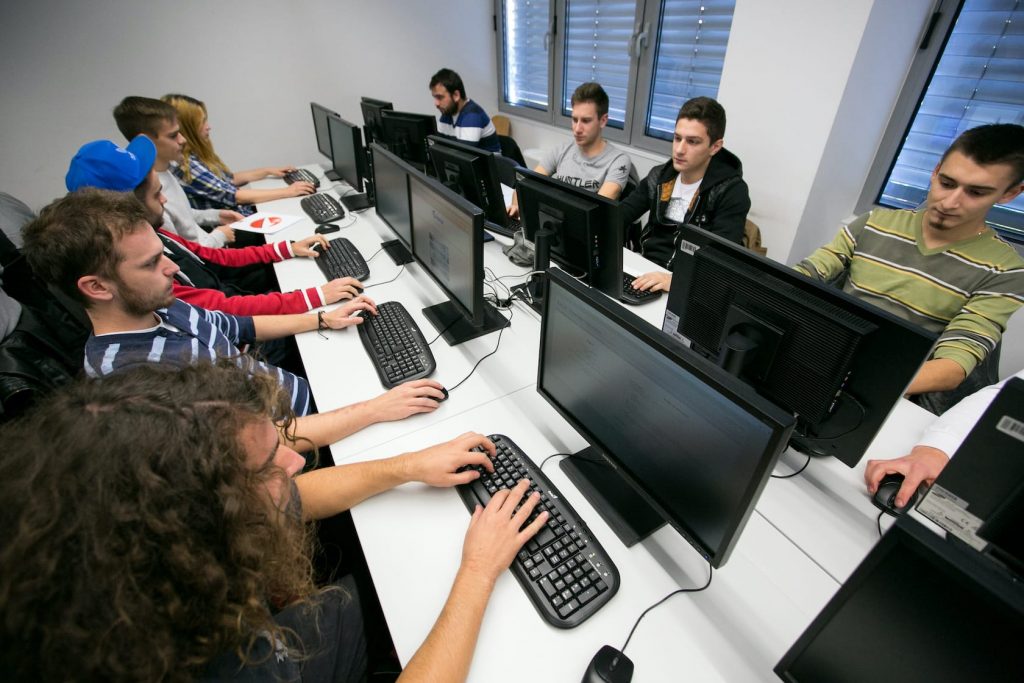This study programme will give you practical knowledge and skills necessary to maintain and manage computer systems in different areas – from business automation to industrial process control. You will learn how to configure computers, networks and operating systems, protect data and help users in dealing with everyday challenges.
About the study
The programme prepares students to perform support roles in the implementation of computers across various segments of business processes and tasks related to computer systems maintenance, such as: selecting and configuring computer hardware and software according to business process requirements, participating in software development, creating and maintaining databases, configuring and maintaining computer networks, configuring and maintaining operating systems, monitoring the security of computer systems and data (protection against unauthorized access, planning and execution of data backups), configuring and maintaining computers used for the supervision of non-computer systems.
Upon completion of the professional study program, students acquire the knowledge and skills necessary for employment in the field of computer systems maintenance and user support.
Professional competences include: designing optimal configurations of personal computers for various tasks, selecting and configuring software according to business process requirements, supporting the design and development of software applications, developing applications in an internet environment, maintaining databases, understanding the basics of computer networks and computer architecture, configuring and maintaining computer networks, configuring and maintaining operating systems, monitoring the security of computer systems and data (protection against unauthorized access, planning and executing data backups), configuring and maintaining computers for the monitoring and control of industrial, energy, and other processes, training users to operate computers and use various applications, setting up and configuring network operating systems and applications on user computers
General competences include: the ability to analyze, synthesize, and think critically when solving complex problems, effective use of the native language and english in reading literature and professional communication, applying knowledge of mathematics and physics to solve engineering problems, proficiency in using standard software tools for document creation, spreadsheets, presentations, and calculations, acquiring the ability to apply knowledge in practice, along with continuous learning and self-learning using literature and modern self-learning tools, the ability to work in a team and make decisions, ethical and responsible thinking and action in professional and social contexts.
Learning outcomes of the study programme:
ORS1. Apply theoretical foundations of mathematics, physics, and electrical engineering in computing
ORS2. Propose software engineering and programming methods using modern programming languages
ORS3. Critically analyze and compare basic architectures, protocols, procedures, and standards
ORS4. Analyze principles and methods of computer systems maintenance and perform quality control in computing in accordance with current procedures and standards
ORS5. Use English in both spoken and written communication within the field of informatics and computing
ORS6. Propose solutions in the field of computing with analysis and evaluation of the same and similar solutions
ORS7. Critically apply modern software tools
ORS8. Adapt computer systems according to user needs
ORS9. Independently apply programming languages in the development, analysis, and adaptation of software
ORS10. Independently or in a team, implement a project according to user requirements and needs, following adopted standards, technologies, methodologies, and presentation techniques
ORS11. Propose solutions in the field of computing and information systems and their environments, with analysis and evaluation of the same and similar solutions
ORS12. Propose solutions to improve the security of computer systems and the data stored on them
ORS13. Present one’s opinions, solutions, and projects using communication skills and technological tools and resources for creating presentations
ORS14. Propose and critically justify creative solutions and evaluate their applicability in a given environment
ORS15. Apply professional literature and use scientific and expert resources available on the Internet
ORS16. Use learning skills, including electronic methods for independent learning (e-learning), in the context of successful studying and lifelong learning and education
